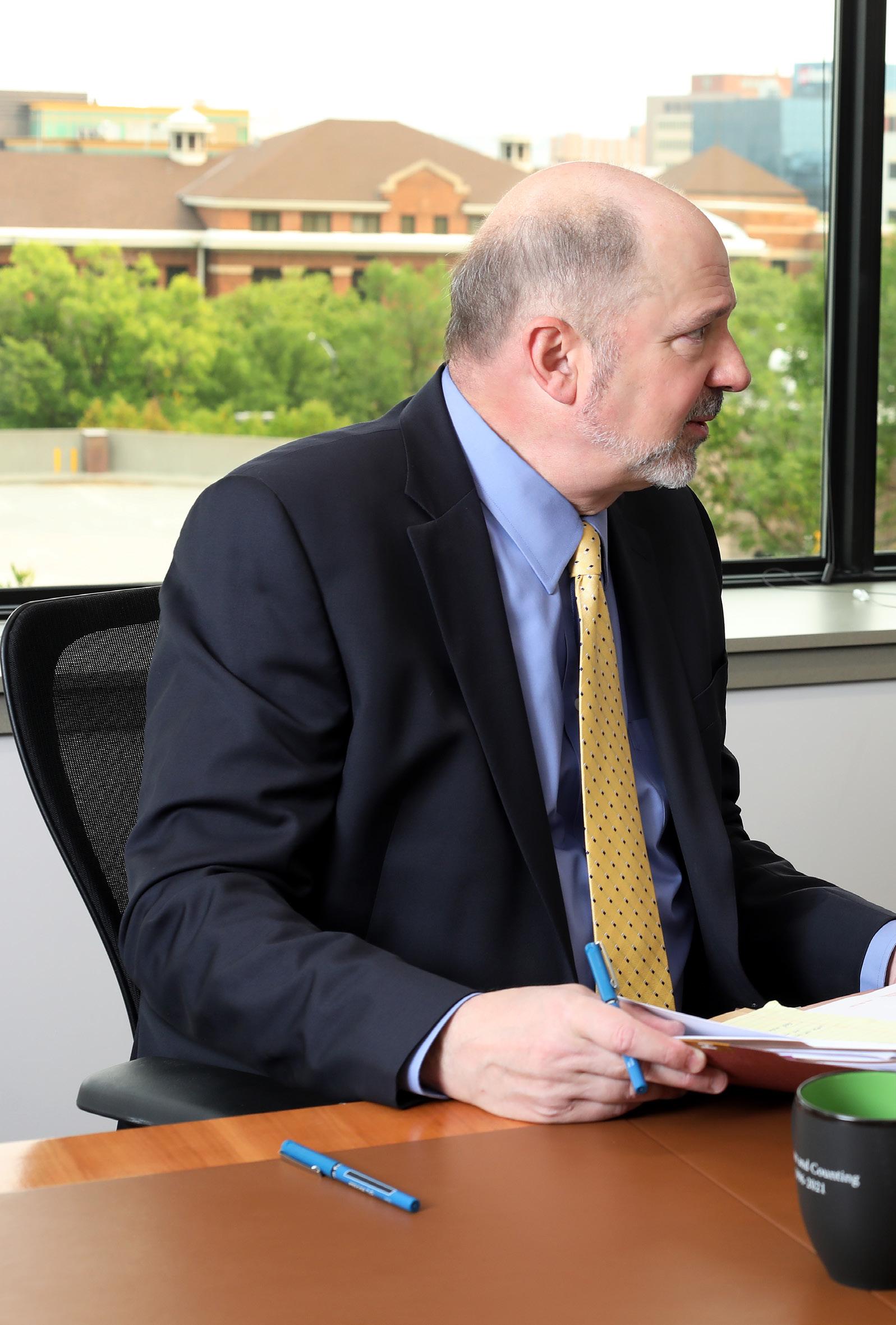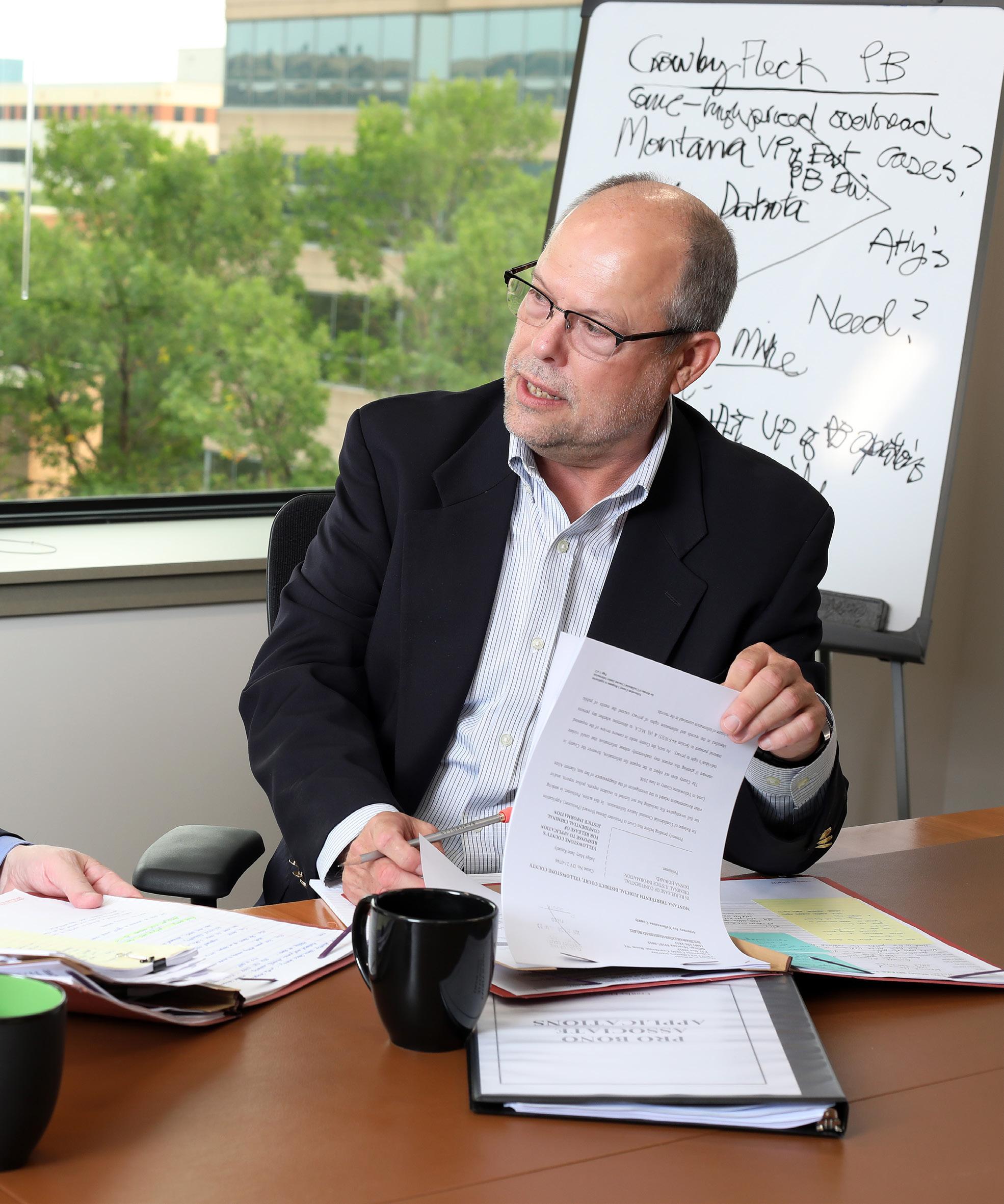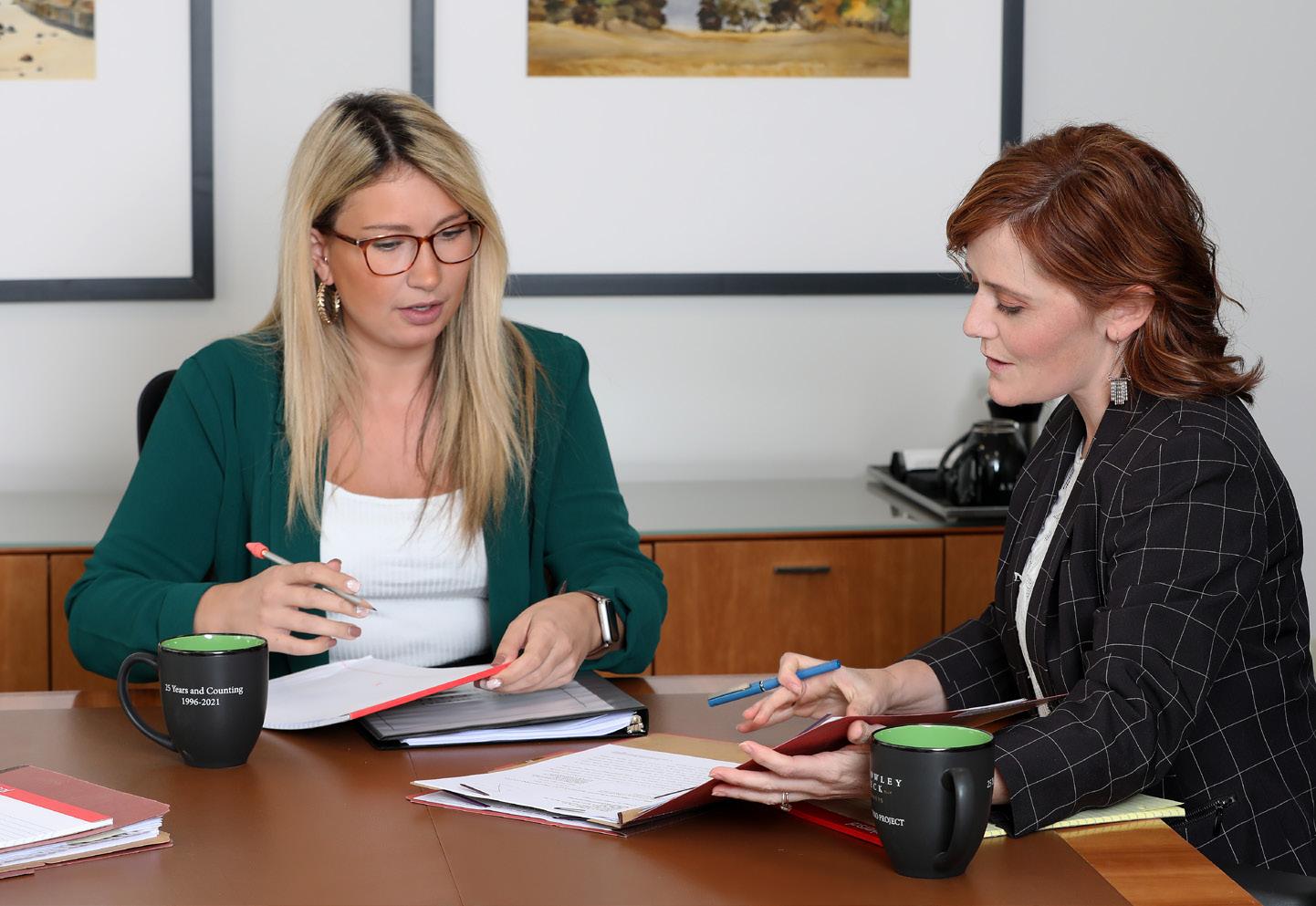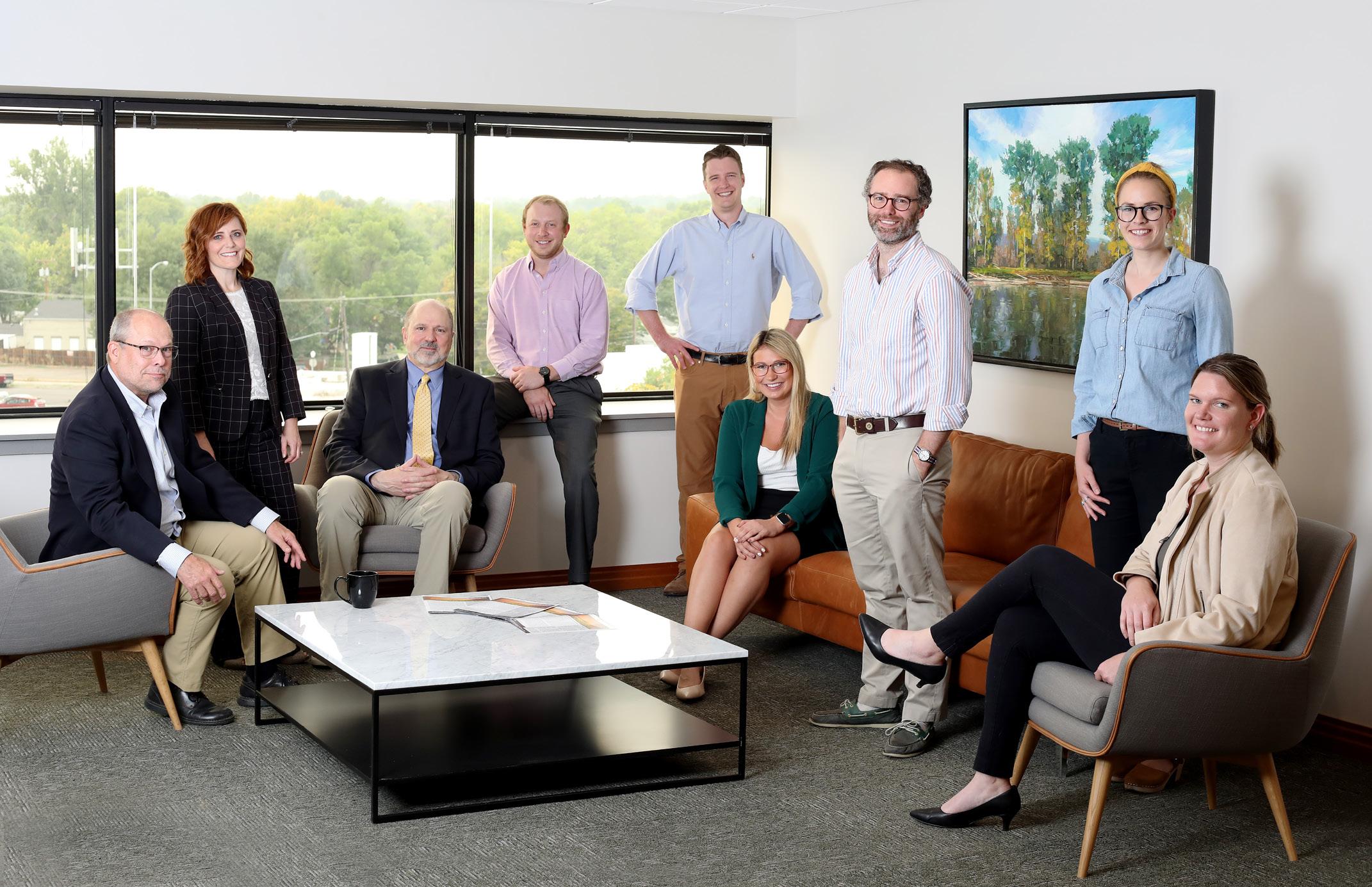
11 minute read
PRO BONO WEEK

Gary Connelley, below, director of Crowley Fleck’s pro bono program, discusses a case with partner Bill Lamdin, above, in the firm’s Billings office. Crowley Fleck’s program is still unique in the Rocky Mountain West 25 years after Connelley joined the firm to launch it in 1996.

Advertisement
A ‘big fish’ with a big heart
Crowley Fleck marks 25 years of firmwide pro bono program that is still unique to the Rocky Mountain West
By Tom Howard
Twenty-five years ago, Gary Connelley had built a reputation as a staunch advocate for farm workers, victims of elder abuse and other lowincome clients through his work as an attorney for Montana Legal Services Association.
But when a friend called him to see if he was interested in coming to talk with the partners at Montana’s largest law firm about a pro bono project, he wasn’t sure what to think.
“I thought it was a prank call at first,” Connelley recalled.
Connelley learned that partners from the firm, now known as Crowley Fleck PLLP, had been discussing a plan to offer a pro bono law program to better serve clients who can’t afford legal representation. The idea behind hiring a full-time pro bono attorney was to explore how the firm could fulfill its professional responsibilities and ethical obligations, Connelley said.
While that initial meeting in the spring of 1996 was by no means a job interview, the partners started picking Connelley’s brain for ideas on what a pro bono program might look like. One discussion led to another, Connelley was offered a position, and the program officially launched on Oct. 1, 1996.
Although lawyers have long been offering free legal help to low-income clients, the program that the firm began was unique within the Rocky Mountain West. At the time the firm was the proverbial big fish in a small pond with about 50 attorneys working from offices in Billings and Helena.

Morgan Dake, right, talks with Billings associate Montana Funk. Dake became the the firm’s second full-time pro bono attorney when the program expanded in 2019.
Photo by Casey Page
“They were by far the smallest firm undertaking anything like this. I investigated fairly closely to see what our chances were of being successful in something that was really unique. I think the next closest firm in size to ours that was doing this was a firm in Kansas City that had about 125 lawyers,” he said.
Connelley doesn’t remember the first case he worked on, but he’ll never forget his first day working at the firm. He was used to wearing a tie to work, but it was a bit of an adjustment getting used to the firm’s more formal dress code. On his first day of orientation, he looked out a fifth-floor office window only to see that his car was being ticketed for an expired parking meter. He hoped it wasn’t an omen for how things would go in his new venture.
Before long Connelley began noticing advantages of working for a larger firm. At MLSA, attorneys often had to share law books. At Crowley, Connelley not only had his own set of books, he also came to enjoy a vibrant work atmosphere and the opportunity to work among so many talented attorneys.
“I tell people that I don’t work in private practice, but I get a pretty good view of it from my office,” said Connelley, whose title is senior pro bono counsel.
The pro bono program was established as a three-year pilot program. Connelley provided regular updates to managers and was gratified that the firm provided whatever expertise and resources he needed.
In some parts of the country, a silk-stocking law firm might take on pro bono work as a way to burnish its image. That’s not the case at Crowley Fleck, which has tailored the program to meet specific needs in the communities it serves.
“Our goal from the beginning of the program is not to cherry-pick cases, not to pick impact cases to take to the Supreme Court,” Connelley said. “Our goal has always been to create a level playing field, to give our clients the opportunity to be successful.”
Over the past quarter century, Crowley Fleck has more than tripled in size, with about 180 attorneys now working in 11 offices in Montana, North Dakota and Wyoming. During that time, the firm has provided tens of thousands of hours of pro bono work to hundreds of clients. As the firm has grown, so has its commitment to pro bono representation.
The program expanded in 2019 when Morgan Dake joined as an additional full-time pro bono attorney. She will head up the program as Connelley prepares for retirement next year. The firm recently hired an additional pro bono attorney who was to start in early October and is expected to play a key role in expanding the firm’s pro bono presence in Wyoming and North Dakota.
“Through the expansion of the pro bono program, the firm has not only solidified the vision and goals for the first 25 years of the Crowley Fleck pro bono program, but has also ensured that the firm’s commitment to pro bono legal services will continue for years to come,” said Benjamin T. Cory, managing partner. “The firm recently celebrated its 125th year and it is fitting that we are following that anniversary with the 25th anniversary of our pro bono program, as the pro bono program has become an essential component of the firm and our culture.”
Cory was inspired to go to law school by his grandmother. After raising four children as a single mother, his grandmother put herself through law school and went on to represent pro bono clients from her own home. When Cory was 10 years old, his grandmother received a pro bono award from the State of California, and he was in the courtroom when she received the award. He keeps a photograph of his grandmother from that day next to his desk as a reminder that providing access to justice is an essential aspect of the practice of law.
“From my grandmother, I know that above all else, community service is part of the privilege of practicing law,” Cory said. “That commitment to service is part of what drew me to Crowley Fleck in the first place. I have been told that Cale Crowley always taught young attorneys that every client deserves our very best efforts regardless of the size of the case or the subject matter. That commitment to quality is integral to the culture of Crowley Fleck and our pro bono program is an essential part of who we are as a firm.”
In 2020 alone, at least 159 attorneys, paralegals and interns worked on 260 cases, 103 of which were opened in 2020. Across the firm, 75% of Crowley Fleck’s attorneys contributed time.
“We very much have this culture that our clients are our clients,” Dake said. “We don’t run a clinic where our pro bono clients get less than our best. When we take a client, it’s with full representation across the firm. We know these clients are as important as any other clients we have.”
Staff members at Crowley Fleck have shown a similar commitment to pro bono clients. Last year pro bono program legal assistant Liisa Johnson and others screened more than 400 requests for pro bono assistance. Likewise, paralegals devote many hours to tasks like discovery and depositions, Dake said.
For the past 10 years, Crowley Fleck has sponsored the summer Dalthorp clerkship in which a law school student works with pro bono clients, attends court and manages cases. According to Pamela Garman, the firm’s second Dalthorp clerk and now a partner at the firm, “The clerkship gives the firm the opportunity to mentor and assist aspiring public interest lawyers by introducing an intern each year to pro bono work and representation of indigent clients over the course of a summer.”
Over the years, Connelley has mentored many lawyers, both inside and outside the firm, on how to handle pro bono cases. Last year alone, Crowley Fleck’s attorneys provided 8,760 hours of pro bono service despite the challenges of working amidst the COVID-19 pandemic.
As the pandemic has unfolded, the courts have been stressed by an increase in evictions, domestic violence and other financial difficulties that have hit the poor hardest, said Patty Fain, pro bono coordinator for the Montana Supreme Court.
“Our clients have so many more pressures on them because of COVID. It gets to the point where there’s just some exhaustion from it,” Connelley said. “Many people are losing housing, and some of those pressures lead to more domestic violence, and it’s becoming more difficult for people to leave that kind of a situation.”
Alissa L. Chambers, a partner in Crowley Fleck’s Helena office, first met Connelley at a new-associate training session 10 years ago. As part of his introduction, he handed out copies of “The Curmudgeon’s Guide to Practicing the Law,” a collection of essays providing advice on how to survive in a law firm.
A few months later, she replied to an email from Connelley and her career took a turn.
“I was a brand-new associate when I got an email from Gary. It was a compelling matter involving child rights. I emailed back and said I’m a commercial transactions lawyer and scared of public speaking, but I have time. He said, ‘All you need is a heart. Come on down to Billings and we’ll work with you.’
“So, right off the bat I had that experience and that gave me the courage I needed to branch out from my practice group and provide some local help in Helena. But it was really Gary’s mentoring and recruitment that made me comfortable to do that,” Chambers said.
Chambers continues her work in commercial transactions but became the program’s pro bono Co-Practice Group Leader in 2018. She dedicates a portion of her hours to the pro bono program.
Referrals come from a variety of sources. Early on, many cases came from MLSA. The program also relies on connections with a variety of nonprofit organizations.
“We work with Tumbleweed (a program that helps runaway teens), and Habitat for Humanity and a number other community groups,” Connelley said. Also, many referrals come directly from district court judges.
Fain said Crowley Fleck’s program still is unique in the region and has played a crucial role in the effort to provide legal services to people with limited financial resources. The program is especially important in rural states like Montana, North Dakota and Wyoming, where many communities lack access to the legal system, Fain said.
“Some communities along the Hi-Line have a poverty rate of 22%,” she said. “The needs are exponentially greater when you have so many people living at or below the poverty line.”
The system for providing legal access to the poor is under continued stress in part because of budget cuts for Legal Services Corporation. According to the Center for American Progress, congressional appropriations for the Legal Services Corporation declined from $770 million annually during the 1980s to $385 million in 2016, yet the need for legal services continues to grow. Learning to do more with less has been par for the course.
“There always has been and there will continue to be a funding shortage,” Fain said.
She said Connelley has also been instrumental in efforts to establish other programs to provide legal services to the indigent, including the Montana Supreme Court’s Court Help Program.

From left, Crowley Fleck’s Gary Connelley, Morgan Dake, Bill Lamdin, Michael Klepperich, Montana Funk, Justin Harkins, Holly Suek, Madeline Clarke are shown in the firm’s Billings office.
Photo by Casey Page
“In all of the years I’ve been involved in the access to justice arena, I’ve never seen anyone with more ability to promote good support for pro bono work, and the concept of how it trickles down,” Fain said. “You’re not helping just one person. It impacts the entire community when you get people back on their feet.”
Pro bono cases that come to Crowley Fleck often involve domestic violence, child custody, parental rights and substance abuse. But one of the more unusual cases to come through the doors occurred some 20 years ago when two Billings nonprofits underwent a corporate merger.
“I was part of a group that was part of the first local chapter of the National Committee for the Prevention of Elder Abuse,” Connelley said. An official at United Way observed that the organization provided some of the same services and had been applying for the same money as another local nonprofit, Senior Helping Hands.
“So they came to us, and there were people here at the firm who knew how to do corporate mergers,” Connelley said. “They were two nonprofits, but they were structured differently. But that was a little complicated in terms of getting the votes from the boards of the different nonprofits.” The newly merged nonprofit eventually became Big Sky Senior Services.
“Gary has always been kind, caring and very understanding,” said Denise Armstrong, who recently retired as executive director of Big Sky Senior Services. “He’s very astute at knowing the law and what can and can’t be done. Gary has had a heart for serving the underserved from the beginning, and we’re fortunate to have him in the community.”
That legacy is deeply ingrained in the firm’s pro bono culture. From the moment clients walk in the door they are treated with dignity, respect, and hopefully, a touch of heart-lifting good humor.
Tom Howard was a reporter and editor at The Billings Gazette for 33 years. He covered a variety of topics, including business and local government







